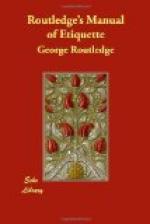Refusal by the Lady’s Parents or Guardians.
It may happen that both the lady and her suitor are willing; but that the parents or guardians of the former, on being referred to, deem the connection unfitting, and refuse their consent. In this state of matters, the first thing a man of sense, proper feeling, and candour should do, is to endeavour to learn the objections of the parents, to see whether they cannot be removed. If they are based on his present insufficiency of means, a lover of a persevering spirit may effect much in removing apprehension on that score, by cheerfully submitting to a reasonable time of probation, in the hope of amelioration in his worldly circumstances. Happiness delayed will be none the less precious when love has stood the test of constancy and the trial of time. Should the objection be founded on inequality of social position, the parties, if young, may wait until matured age shall ripen their judgment and place the future more at their own disposal. A clandestine marriage should be peremptorily declined. In too many cases it is a fraud committed by an elder and more experienced party upon one whose ignorance of the world’s ways and whose confiding tenderness appeal to him for protection even against himself. In nearly all the instances we have known of such marriages, the results proved the step to have been ill-judged, imprudent, and highly injurious to the reputation of one party, and in the long run detrimental to the happiness of both.
* * * * *
III—ETIQUETTE OF AN ENGAGEMENT.
We will now regard the pair of lovers as formally engaged, and bound together in that state of approximation to marriage which was in the ancient Christian Church, and indeed is still in many countries of Europe, considered in a very sacred light, little inferior to, and, in fact, regarded as a part of, marriage itself—the Betrothment.
Conduct of the Engaged Couple.
The conduct of the bridegroom-elect should be marked by a gallant and affectionate assiduity towards his lady-love—a devouement easily felt and understood, but not so easy to define. That of the lady towards him should manifest delicacy, tenderness, and confidence; while looking for his thorough devotion to herself, she should not captiously take offence and show airs at his showing the same kind of attention to other ladies as she, in her turn, would not hesitate to receive from the other sex.
In the behaviour of a gentleman towards his betrothed in public, little difference should be perceptible from his demeanour to other ladies, except in those minute attentions which none but those who love can properly understand or appreciate.
In private, the slightest approach to indecorous familiarity must be avoided; indeed, it is pretty certain to be resented by every woman who deserves to be a bride. The lady’s honour is now in her lover’s hands, and he should never forget in his demeanour to and before her that that lady is to be his future wife.




